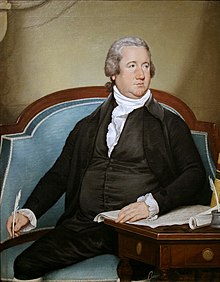Muhlenberg legend
The Muhlenberg legend is the legend according to which, at the time of the founding of the United States of America , there was supposed to have been a bill to introduce German as the official language in Pennsylvania . The law is said to have failed due to a single vote, namely the contradiction of the German-American Muhlenberg. The Muhlenbergs were a well-known family of German descent in US politics. The legend was therefore attached to the person of the Speaker of the House of Representatives Frederick Muhlenberg (1750-1801). His brother General Peter Muhlenberg (1746–1807) also plays a role.
The rumor arose around 1840 and was widely circulated through Franz von Löher's book History and Conditions of Germans in America , published in 1847 . In it, Löher explains that when there was a vote on whether German should become the official language in Pennsylvania, the votes were immediately cast. The spokesman for the state parliament, a Mühlenberg, had voted in favor of English. He is said to have said: "The faster the Germans become Americans, the better."
backgrounds
The United States emerged from English colonies. The court and administrative language was English . German and other languages were used frequently in private and in church-public areas. The proportion of German-speaking immigrants in the United States was one-third in Pennsylvania by 1830 and just under nine percent in the entire United States. There has never been a vote on an official language in the USA or in individual states . To date, the United States has not adopted an official language and is one of the few countries in the world without a de jure official language (with English serving as the de facto official language). However, especially in recent times, a number of states have defined English as the official language (see official languages in the US states ).
Points of contact
Von Löher does not name any sources for his story. The state assembly would have to be the state assembly of Pennsylvania meeting in Philadelphia . The Federal Congress also met in Philadelphia from 1790 to 1800. Which Muhlenberg von Löher meant remained unsaid. Frederick Muhlenberg (1750-1801) was 1780-83 member and spokesman of the Pennsylvania state assembly, 1787 President of the Pennsylvanian Convention for the Ratification of the Federal Constitution and 1789-97 member of the House of Representatives in the Federal Congress and in the years 1789-91 and again 1793-95 spokesman of the House of Representatives . Muhlenberg's decisive vote for the Jay Treaty with the Kingdom of Great Britain in 1794 caused so much bad blood that his own brother-in-law Bernard Schaeffer stabbed him with a knife two days after the treaty was ratified and that he was not re-elected to Congress in 1796 . General Peter Muhlenberg (1746–1807), his brother, was also a congressman and advocated the introduction of English instead of German as the church language in the Evangelical Lutheran Congregation in Philadelphia against Heinrich Helmuth .
German immigrants from Virginia petitioned the House of Representatives on January 9, 1794, demanding that certain or all legal texts also be published in German in order to make it easier for Germans who did not speak English to understand the laws of their new homeland . The petition was negotiated in a committee that first consisted of MPs Preston from Virginia and Hiester and Peter Muhlenberg from Pennsylvania, later Moore from Virginia, Baldwin from Georgia and Hiester. The process and outcome of the decision is described differently: the application was rejected directly or referred to the main committee, which rejected it with 42 to 41 votes. Frederick Muhlenberg, the Speaker of the House of Representatives, did not vote, abstained or cast the decisive 42nd vote.
literature
- C. Wolf: German culture in the life of peoples. Announcements from the German Academy, 1932, p. 285.
- Elsie M. Szecsy: German Language in US History. In: Encyclopedia of Bilingual Education. Sage, 2008, ISBN 978-1-4129-3720-7 , pp. 320-321.
Web links
- House documents No. 50: Laws Published in the German Language (April 1, 1794) . American State Papers. class X: Miscellaneous, Vol. 1, p. 81.
- House documents No. 59: Promulgation of the Laws (December 23, 1794) . American State Papers. class X: Miscellaneous, Vol. 1, p. 114.
- House documents No. 62: Promulgation of the Laws (January 29, 1795) . American State Papers. class X: Miscellaneous, Vol. 1, p. 122.
Individual evidence
- ^ Franz von Löher : History and conditions of the Germans in America , Cincinnati and Leipzig 1847, p. 198. Online
- ↑ a b c German as the official language of the USA by Bastian Sick , column onion fish on Spiegel Online , May 19, 2004
- ^ National Archives: Letter from Frederick Muhlenberg to Thomas Jefferson, February 11, 1801, with comments. On-line
- ^ Daniel Jay Grimminger: Sacred Song and the Pennsylvania Dutch , Rochester, NY: University of Rochester Press, 2012, ISBN 978-1-58046-383-6 , p. 42. Online
- ↑ a b The tip of the scales by Christoph Drösser , Column Right? in der Zeit , No. 35/1997
- ↑ Urban Legend: German almost became the official language of the US (English)
- ^ Max Kade Institute: German-American Language Myths: German as the Official Language of the US. Retrieved June 1, 2019 . (English)
- ↑ a b The Indiana University-Purdue University Indianapolis Library on the Muhlenberg legend ( Memento from June 24, 2010 in the Internet Archive ) (English)
- ↑ Wolf 1932, p. 285
- ↑ Ceryx.de: The Muhlenberg legend: German as the official language of the United States? ( Memento from May 18, 2005 in the Internet Archive )

